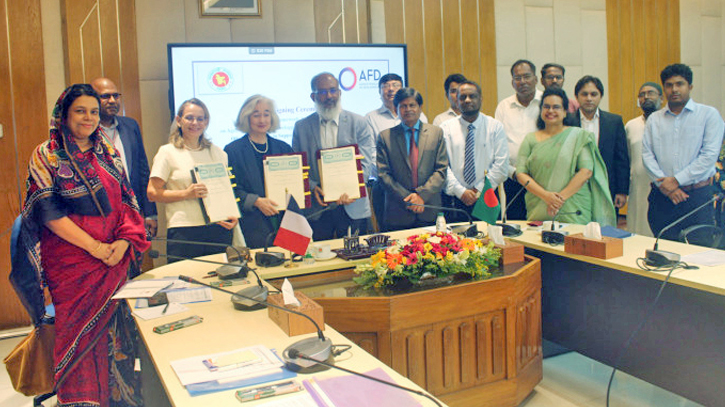
Photo : Collected
Agence Francaise de Developpement (AFD) will provide 300 million euros in budget support to Bangladesh to help the country fight against climate change.
A concessional loan agreement was signed between the Bangladesh government and AFD on Monday, according to a press release. The programme is titled “Policy Loan in Support of GOB Climate Change Agenda.”
The three-year programme covers the period 2023-2026. It also includes 5 million euros in grants to finance technical cooperation for the different stakeholders involved in the implementation of the policy loan.
The programme aims to support Bangladesh's climate-resilient and low-carbon development pathway, in line with the medium and long-term national priorities defined in the National Adaptation Plan (NAP), the Mujib Climate Prosperity Plan (MCPP) and the Nationally Determined Contributions (NDC). The first loan of 100 million euros is likely to be disbursed by June this year.
Md Shahriar Kader Siddiky, secretary at the Economic Relations Division, and Cecilia CORTESE, AFD Deputy County Director for Bangladesh, signed the agreement on behalf of Bangladesh and the AFD, respectively. Ambassador of France to Bangladesh Marie Masdupuy was also present at the signing ceremony.
The AFD is a bilateral development agency implementing Official Development Assistance on behalf of the French government. It has been operating in Bangladesh since 2012. It supports development projects for power & energy, environment and climate change, transport and communication and health sector. At present, AFD has been funding some 11 on-going projects in Bangladesh.
All the projects entail net assistance amount of 1,141.86 million euros ($1,242.71 million). More precisely, it consists of 1,122 million euros ($1221.10 million) of loans and 19.89 million euros ($21.65 million) of grants. AFD has so far disbursed 2,207.56 million euros ($2402 million) in technical assistance and loans, of which 1,084.48 million euros ($1180 million) have been disbursed as of June 2023.
Despite significant gains in reducing the human toll from climate disasters, Bangladesh continues to face severe and increasing climate risks. Without urgent action, including further adaptation and resilience measures, the country’s strong growth potential could be in risk, according to the World Bank Group’s Country and Climate Development Report for Bangladesh released in October 2022.
The report outlined priority actions and financing needs to help Bangladesh address the climate crisis. It recognised Bangladesh’s successful experience with locally-led climate adaptation and recommends investments in infrastructure and services to strengthen climate resilience while supporting long-term growth. Actions focused on improved agriculture productivity, energy and transport efficiency can lower future emissions while improving air, soil, and water quality.
The report estimated that Bangladesh could raise up to $12.5 billion in additional financing in the medium-term for climate action. Financing options include budget prioritisation, carbon taxation, external financing, and private investment.
Climate change will hit poor and vulnerable people the hardest, the report said. Average tropical cyclones cost Bangladesh about $1 billion annually. By 2050, a third of agricultural GDP could be lost and 13 million people could become internal climate migrants. In case of a severe flooding, GDP could fall by as much as 9 per cent.
Messenger/Fameema








